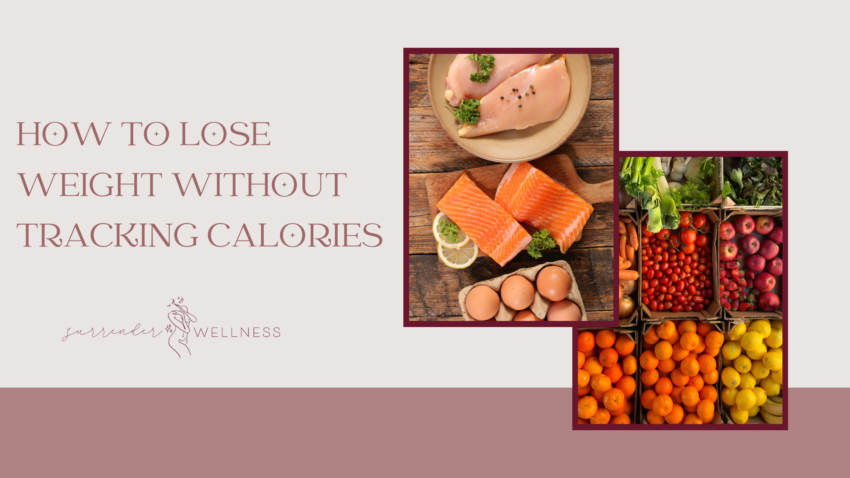When it comes to weight loss, the main goal should be to lose weight while still eating as much as possible. Another huge goal for women is to lose weight without tracking calories. At this point, you are probably no stranger to the term calorie deficit. This means you are consuming less calories than you burn in a day. This is the only way fat loss occurs.
That said, you can create a calorie deficit by eating less and/or moving more. Much of the progress you are looking for during your weight loss journey will likely come from your nutrition. The key is not to under-eat too much.
Yes, you will want to monitor your portion sizes and overall consumption, but you don’t want to be too under-fueled that it hurts your energy and recovery. There is a sweet spot to all the madness, and if you want to know how to better calculate your energy needs, check out this post here. (Reminder: you CAN lose weight without tracking calories, but I just wanted to link this here in case you want to check it out!
But if you are looking for an approach that doesn’t involve numbers and tracking food, I would prioritize these things:
Eat at least 3 meals / day at consistent meal times
Having consistent meal times each day will be a helpful way to actually make sure that you are eating enough food. Sometimes people naturally tend to skip a meal when trying to lose weight, and while fasting does work for some, it might not work well for all. Having consistent meal times helps your body know when to expect fuel and regulates hunger hormones like ghrelin and leptin. This means fewer intense cravings, less overeating at night, and more control over portion sizes.
Your digestive system also works best when it has predictable eating patterns. When meals are erratic, digestion can slow down, leading to bloating, discomfort, and even irregularity. Keeping meal times consistent supports a healthy gut and better digestion.
30 g protein / meal – at minimum
First off: protein isn’t just for bodybuilders. It’s for any woman who wants to feel strong, stay full longer, and actually see progress in her fitness journey. Protein is a key nutrient for your overall satiety. By prioritizing protein at meals, you will keep your body fuller longer, reduce feelings of hunger between meals, and help balance your blood sugar better.
Protein is essential for muscle building, and chances are if you are on a weight loss journey you are probably hitting the gym too. So this will help you preserve muscle mass while losing fat. Not to mention, it helps you feel energized, which is key to the weight loss journey as well!
Eat the rainbow
Try to consume servings of fruit and or vegetables of every color daily. It’s a challenge and a great way to not to overthink how you are going to get those nutrients in. Fruits and veggies tend to be a struggle for some people. By thinking about it as a challenge, it can reduce feelings of overwhelm and encourage you to try new things!
Make one meal either a smoothie or a salad
A salad and/or smoothie is a sure fire way to get those fruits and veggies in. This is an easy way to also maybe cut back on carbs a little. Having one meal contain more of your micronutrients in it can help you just get it all in and out of the way for the day so that you can focus on other things.
These meals tend to be a little more voluminous as well. This is helpful for feeling fuller longer and you can eat more for less. But don’t forget to include that protein! Top your salad with salmon, chicken, or tuna. Sneak in protein powder or greek yogurt to those smoothies! Just because these meals might be fruit and veggie heavy doesn’t mean you should neglect keeping it balanced with all three macronutrients!
Be more present during meal times
When was the last time you ate a meal in silence or without watching something on a screen? Meal time has quickly become a way for people to multitask rather than slow down. So often you are watching a show, tiktoks, or even working while eating, that you forget you are even eating!
Slowing down and enjoying your meals is great for your gut health. As is actually being mindful and chewing your food fully. Digestion starts in the mouth, so you might as well take the time to chew your food and enjoy it! This will help reduce bloating and gastric distress that you may sometimes get after eating. You might even find that you notice the “I’m full” cues from your body a little better, which will help you consume a little less.
Keep in mind, all bodies are different. What works for you or me, might not work for someone else. There will always be a little trial and error involved when it comes to your dietary needs. Be flexible with yourself enough that you aren’t in the dangerous restriction zone, yet disciplined enough to actually be consistent long enough in order to see results.
At the end of the day, during a calorie deficit phase, you will at some point feel hungry. Hunger is okay, and part of the process. But you don’t want to be so hungry that you overindulge. Learn to listen to your body, but also know that losing weight does require a little bit of sacrifice and commitment. You CAN do this and hopefully these 5 habits will help make it feel a little more manageable to lose weight without tracking calories.

